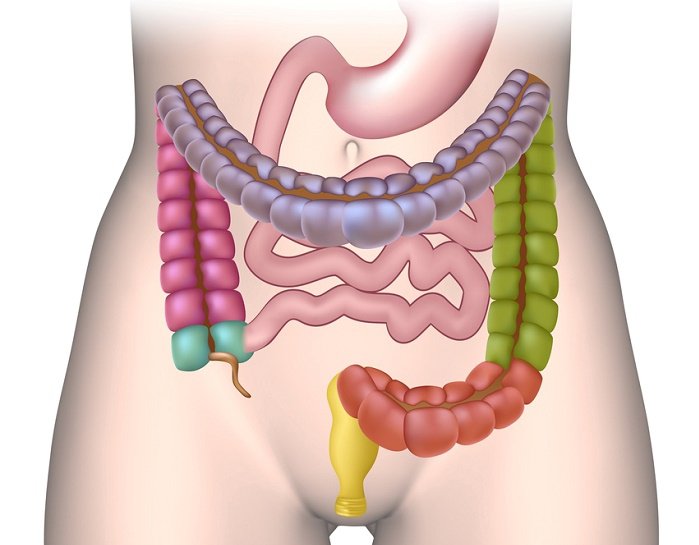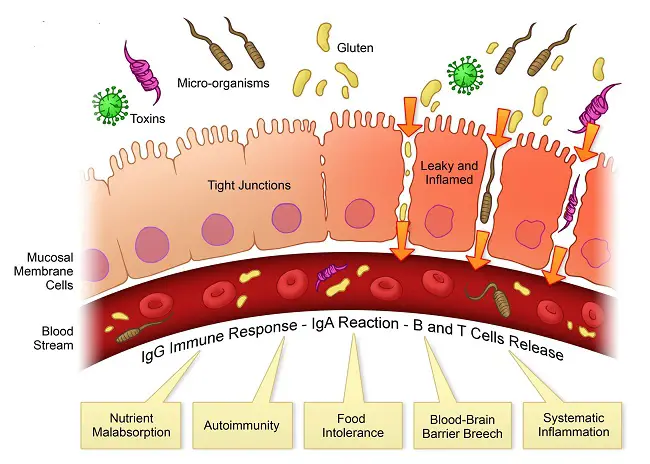When someone has a combination of irritable bowel syndrome, fibromyalgia, allergies or mood problems, it is very likely that there is an intestinal imbalance, like a perforated intestine and/or a permeable intestine, among other imbalances.

Why do our intestines become perforated? Because of antibiotics, diets low in fiber, and toxic processed foods, to start. As a result, the beneficial bacteria in the digestive tract die and the “not so good” bacteria multiply, which predisposes us to weight gain, infection and chronic illness.
5 signs that you could have a perforated intestine
Pay special attention to the following signs that indicate you could have a perforated intestine or be suffering some imbalance in your intestines. These symptoms are more apparent in some people than in others, and sometimes people go a long time without experiencing symptoms and only realize it when this imbalance starts sending red alerts by way of other diseases or chronic illnesses. If you see any of these signs, even mildly, make sure you see a specialist to get it checked.
1. You’re depressed or anxious
The intestine is also known as the “second brain”. More than 80% of the serotonin in the body is made in the intestine. There are also neurons there that “talk” to the bacteria. The intestine is so important for mood, memory and concentration that in the future, psychiatrists will have to focus on the intestine as much as the brain in their treatment plans.
2. You’ve developed food allergies
The intestines are the center of the immune system, being where 70% of our antibodies are made to combat foods and other allergens. Our intestinal lining is supposed to protect us from toxins and food allergens, but when it is compromised, these toxins enter the bloodstream. (This is also believed to be a reason for gluten intolerance and celiac disease.)
3. You suffer from chronic inflammation and irritable bowel syndrome
This is the way most people recognize an intestinal problem. Once again, this is our body responding to an imbalance between beneficial bacteria and the toxic ones. It is thought that the nervous system of the intestine is more sensitive in patients with irritable bowel syndrome.
4. You’re gaining weight
Obesity and increase in body weight are being considered problems related to inflammation. The theory goes like this: if you eat sugar and processed foods, the good bacteria in your intestine are replaced with inflammatory bacteria that produce toxins. This is supported by the fact that reducing inflammation in general can mitigate weight gain.

5. You have chronic asthma and/or seasonal allergies
The rates of asthma are higher in western societies, such as the United States and Europe, not to mention seasonal allergies. One theory is that this is happening in part because our modern diet and medical practices are provoking a decrease in the population of micro biota in our intestines. This “hygiene hypothesis” also explains why children raised in environments rich in microbes, such as those who grow up with pets, on farms or attend day care, have a lower risk of allergies.
Ok, now you know the signs, but what should you do?
This is currently being investigated, and there is still much to learn in this emerging field. But what we do know is that a healthy, unprocessed diet is helpful. Review the following list of what you should include and eliminate if you suffer from intestinal imbalance.
- Avoid dairy products since these encourage bad bacteria to multiply, which will make your problem worse.
- Avoid eating any type of sugar. Sugar is the favorite food for bad bacteria in the intestines.
- Also avoid artificial sweeteners (which can kill the good intestinal bacteria).
- Avoid MSG (monosodium glutamate), and foods with preservatives and additives.
- Avoid irritating beverages like carbonated beverages, sweetened juices, teas, coffees and chocolate.
- Eating whole, unprocessed foods is essential. Use whole grain rice, wheat, barley, rye, oats, etc.
- It is preferable to avoid grains that contain gluten, even if they are whole grains. Gluten is associated with intestinal imbalance and specifically with perforated intestine. Opt instead for grains like rice and oats (gluten free), buckwheat and others. Review our article 9 gluten free grains filled with nutrients.
- Obviously integrate more natural fiber, which is present in fruits and vegetables.
- Drink enough water to keep your body well-hydrated. Review our article: 5 ways to drink enough water during the day.
Lastly, the growth of a healthy micro flora through natural probiotics/prebiotics has been shown to “cure” the intestine.
You should do all of this under the care and supervision of a specialist in this type of problem who knows how to use natural approaches without further stressing the intestine with strong medications that end up being counterproductive for your intestine.
